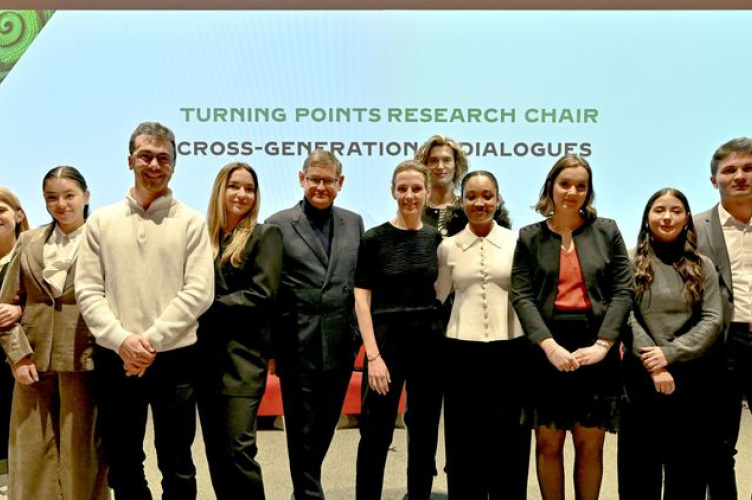On March 6, ESCP Business School, in partnership with Cartier and HEC Paris through the Turning Points Chair, hosted the second edition of "Cross-Generational Dialogues". This year’s theme, "Commitment in the Time of Flexibility," delved into the evolving perceptions of commitment across generations, particularly within Gen Z, and its impact on leadership, careers, and personal fulfillment.
The event was inaugurated by Leon Laulusa, Executive President and Dean of ESCP Business School, and Andrea Masini, Dean of Faculty and Research at HEC Paris, setting the stage for a rich exchange of ideas. The introduction was led by Oksana Ponomarenko and Sayoko Perle Magron, project managers of the Gen Z Observatory 2024-25, who outlined the key questions driving this year’s discussion.
Understanding Gen Z’s Perspective on Commitment
This year's cohort of the Gen Z Observatory, a modern think tank composed of 21 ESCP and HEC Paris students and Cartier worldwide employees, examined the generation’s approach to commitment in personal and professional spheres. The findings challenged the stereotype that Gen Z struggles with commitment, revealing instead an evolving definition shaped by economic, environmental, and technological factors:
-
Commitment is fluid and purpose-driven, aligning with personal values rather than rigid societal expectations.
-
Work is seen as a path to fulfillment, not just stability, balancing career ambitions with self-discovery.
-
High-performance pressures and information overload impact how Gen Z engages with long-term professional commitments.
-
Personal identity and evolving priorities influence their commitment choices, emphasizing adaptability over permanence.
Keynote & Panel Discussions
The keynote by Erik Fradet, an HEC Paris student, brought a personal dimension to the discussion. He shared a transformative experience of nearly losing his life five years ago, illustrating how adversity reshapes commitment, resilience, and long-term aspirations.
Panel 1: What Does It Mean to Live Without Committing?
Moderated by Anne Laure Sellier, Professor at HEC Paris and Co-scientific Director of the Turning Points Chair, this panel explored how modern commitments are influenced by societal changes and shifting generational priorities. Cyrille Vigneron, Chairman of Cartier Culture and Philanthropy, alongside students Erik Fradet and Teodora Radenovic, Gen Z Observatory content curator 2024-25, HEC Paris, debated whether commitment is a necessity for fulfillment or a burden in an era of limitless options.
Key insights included:
-
Commitment fosters growth, resilience, and meaningful relationships.
-
The contrast between past and present commitments: older generations viewed commitment as an obligation, while Gen Z sees it as a choice aligned with personal evolution.
-
Leadership demands unwavering commitment, challenging the notion of selective engagement.
Panel 2: Leadership in the Time of Limited Commitment
Moderated by Benjamin Voyer Professor at ESCP Business School and Co-scientific Director of the Turning Points Chair, this panel examined leadership challenges in an era where long-term commitments are increasingly fluid. The discussion featured:
-
Cyrille Vigneron
-
Gilles Vanderpooten, CEO of Reporters d’Espoirs
-
Yelissah Gabala, ESCP Business School student, Gen Z Observatory content curator 2024-25
Main takeaways:
-
Organizations should adapt to Gen Z’s approach to commitment, integrating flexibility while maintaining a strong sense of purpose.
-
Leadership today is about inspiration over obligation, with trust and mentorship playing crucial roles in fostering commitment.
-
Commitment within organizations must be reciprocal, offering growth opportunities and alignment with employees’ values.
A Collaborative Research Approach
The Gen Z Observatory’s research underscored intergenerational differences and shared values, challenging preconceptions about workplace loyalty and personal dedication. It highlighted the shift from long-term loyalty to organizations toward a commitment to purpose, well-being, and meaningful impact.
-
Commitment is a journey of self-discovery, requiring authenticity and the ability to say ‘no’ to misaligned paths.
-
Socioeconomic security influences commitment choices, with flexibility often being a privilege.
-
Navigating abundant opportunities in elite institutions presents both freedom and pressure.
Conclusion: Commitment as a Dynamic Force
The second edition of Cross-Generational Dialogues provided a platform for a rich and thought-provoking discussion on commitment in contemporary society. The conversation highlighted how commitment is no longer about permanence but about alignment, growth, and adaptability. As organizations, leaders, and individuals navigate a world where flexibility is the norm, understanding commitment as a dynamic, evolving force is essential for shaping the future of work, leadership, and personal fulfillment.
ESCP, Cartier, and HEC Paris remain committed to fostering these vital intergenerational dialogues, ensuring that future discussions continue to bridge perspectives and inspire meaningful change.
Campuses
